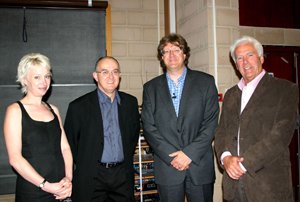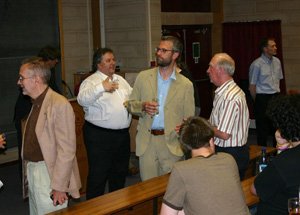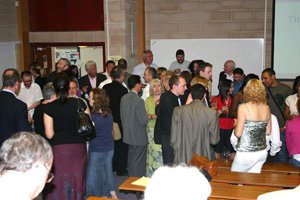 The picture shows Tamsin O'Brien (BBC), Graham Greer (Centre for Journalism,
The picture shows Tamsin O'Brien (BBC), Graham Greer (Centre for Journalism,
Trinity & All Saints), Mark Byford and Terry Mounsey (RTS) before the Mark Byford Lecture.
Chris Meehan reports.
In another life, I was once taken to task by a boss for being ‘too enthusiastic’ and told my character trait was a decided weakness, so it was refreshing to spend a few hours in the company of Mark Byford, a BBC ‘Big Gun’, who is, by his own admission, an irrepressible and all round enthusiast!
Big Guns Roll into Town roared the publicity - which amused the DDG – more a ‘pistol’ he said modestly. Celebrating 27 years at the BBC on the very night of his address at Trinity and All Saints College, Leeds, the audience was given an insight into Byford’s secret of career success – luck and his trademark enthusiasm! He studied law at Leeds University and whilst contemplating a potentially successful career as a barrister, became fascinated by the case of George Markov - allegedly murdered in London by Bulgarian political agents, using a poisoned tipped umbrella. The story proved to be a catalyst for the DDG, realising the law was not for him, he eventually joined BBC Leeds in 1979, aged 20, as a “temporary holiday relief assistant” working as a researcher over the summer holiday in his local television newsroom. Mark is now head of all its journalism and as Chair of the BBC’s Journalism Board, he has overall responsibility for the world’s largest and most trusted news organisation (‘better to be second and right than first and wrong’), providing extensive news and current affairs services across radio, television and new media for the UK and the world.
 He set a cracking pace as his presentation took us through the early Thatcher years, recession and unemployment, with video clips of Look North news stories that broke new ground in television journalism. He praised Yorkshire Television’s early influential programmes produced by John Willis singling out Johnny Go Home; Alice – A Fight for Life and Rampton – The Secret Hospital, as programmes that set the gold standard for investigative journalism. In an organisation that has, as its goal, delivery of the best journalism in the world, it’s no accident that John Willis is now a member of the same Journalism Board chaired by the DDG.
He set a cracking pace as his presentation took us through the early Thatcher years, recession and unemployment, with video clips of Look North news stories that broke new ground in television journalism. He praised Yorkshire Television’s early influential programmes produced by John Willis singling out Johnny Go Home; Alice – A Fight for Life and Rampton – The Secret Hospital, as programmes that set the gold standard for investigative journalism. In an organisation that has, as its goal, delivery of the best journalism in the world, it’s no accident that John Willis is now a member of the same Journalism Board chaired by the DDG.
 Recognising the sea change to the way journalism is now created a specially made video chronicled how a disaster like 7/7 might be played out on the many news platforms likely to be available in 2010. The video scenarios demonstrated how everything from pod-casting and wi-fi to Internet video blog and web cams would combine with mobile phone technology to give ‘citizen journalists’ access to all news platforms. In this explosion of choice ‘clickers and flickers’ will be in their element ‘traditionalists’ and ‘mix and match’ news consumers will be on the decline. In his bid to avoid allowing the BBC to besome a ‘heritage brand’, Mark Byford has embraced technology but not to the detriment of content and the very best journalism and he firmly believes that the‘big stories are the big shapers of reputation.’ His aim is to deliver world-class journalism on demand now and in the future. He is determined to use new media to cover whatever news-worthy events happen in 2010 – we can be sure the BBC will be there bristling with the latest technology to record and report to a world-class standard and, oh yes, if Mark Byford has anything to do with it, delivered to your chosen piece of kit with tremendous enthusiasm.
Recognising the sea change to the way journalism is now created a specially made video chronicled how a disaster like 7/7 might be played out on the many news platforms likely to be available in 2010. The video scenarios demonstrated how everything from pod-casting and wi-fi to Internet video blog and web cams would combine with mobile phone technology to give ‘citizen journalists’ access to all news platforms. In this explosion of choice ‘clickers and flickers’ will be in their element ‘traditionalists’ and ‘mix and match’ news consumers will be on the decline. In his bid to avoid allowing the BBC to besome a ‘heritage brand’, Mark Byford has embraced technology but not to the detriment of content and the very best journalism and he firmly believes that the‘big stories are the big shapers of reputation.’ His aim is to deliver world-class journalism on demand now and in the future. He is determined to use new media to cover whatever news-worthy events happen in 2010 – we can be sure the BBC will be there bristling with the latest technology to record and report to a world-class standard and, oh yes, if Mark Byford has anything to do with it, delivered to your chosen piece of kit with tremendous enthusiasm.


